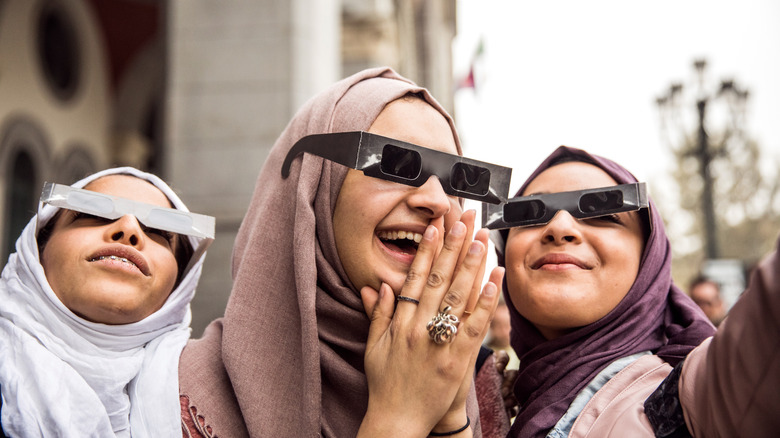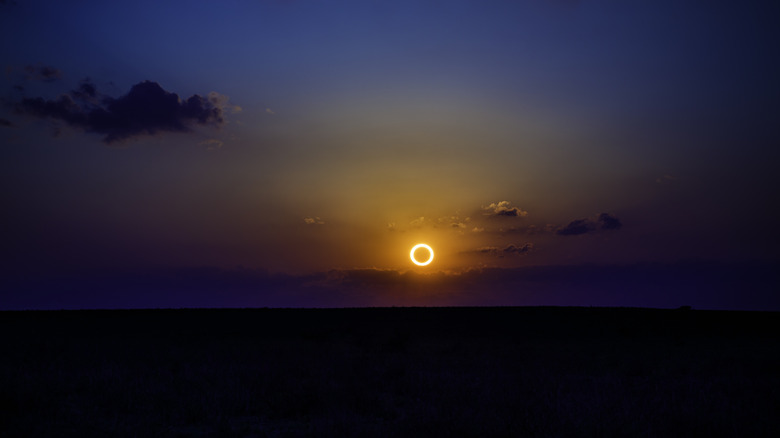What's The Difference Between Types Of Eclipses Anyways? (FYI, There's More Than You Thought)
If you've ever been curious about the eclipses we hear about each year, the differences between them all come down to shadows, the tilt of an orbit, and the movement and positions of the Earth, sun, and moon relative to each other.
In total, there are seven eclipse types. Although a total solar eclipse is what most people think of when they hear the word "eclipse," it's actually the rarest to see. Li Cohen of CBS News reports, "Total solar eclipses happen every one to three years, but the events are usually only visible from Earth's poles or from the middle of the ocean." The other solar eclipses are partial, hybrid, and annular. Lunar eclipses conversely, come in three types: total, partial, and penumbral.
The way we study eclipses and how they affect life on Earth falls into two distinct disciplines: astronomy and astrology. Astronomers love examining eclipse activity because it reveals so much about the sun's structure and deepens our scientific understanding of space itself. Astrologers get excited about how eclipses shift the planetary energies to impact world events and our personal lives.
Solar and lunar eclipses from an astronomer's point of view
From an astronomical point of view, all eclipses occur based on the specific positioning of the planets. In the case of any solar eclipse, they happen when the moon is wedged between the Earth and the sun, which blocks some or all of the sun's light. This casts a shadow on the Earth.
The four solar eclipses each look slightly different. In a partial solar eclipse, the most common kind, the sun looks like it's had a bite taken out of it by the moon. The moon appears to cover the sun completely in a total solar eclipse. An annular solar eclipse occurs only when the moon is farthest away from Earth. Because the moon looks smaller, it doesn't cover the sun's circumference, and so it's encircled with a ring of light. Due to the Earth's curvature, a hybrid solar eclipse appears to be either total or annular depending on where you live.
What looks different in lunar eclipses is the intensity and degree of the shadow cast on the moon, which happens when the moon is behind the Earth. The center of the Earth's shadow is the darkest part, called the umbra. When the whole moon passes through it, it's a total lunar eclipse. A penumbral eclipse is similar, but the moon passes through the outer edges of the Earth's shadow, which is less dramatic. In a partial eclipse, only part of the moon moves through the umbra.
Astrology's take on eclipse season
In contrast, astrologers view eclipses as bringing on fated, emotionally charged events. Astrology is often used as a way to understand our psychological patterns. For example, in a person's natal chart, the moon represents our internal, emotional landscape. On his YouTube channel, astrologer Athen Chimenti says "The moon is receptive, it's nurturing, it's acceptance. It's emotional security. Or emotional insecurity because it's always changing."
Astrologers assign full moons and new moons specific functions. Astrology considers full moons a time of releasing or completing. A lunar eclipse happens on a full moon and can signify an ending. They view new moons as an auspicious time to start something new and to focus on what one prefers in life. A solar eclipse happens during a new moon and inaugurates another life phase.
Renowned astrology expert, Susan Miller's foundational eclipse guide provides perspective. She writes, "With all eclipses, something ends, and something else begins ... Once we go through an eclipse, we can never go back to the former situation again, for the universe wants us to make progress ... The only way with an eclipse is forward." Eclipses often signal massive life shifts, but only if they aspect your personal chart in that way. If an eclipse happens to fall near your birthday, it can prepare you for major life changes. A lunar eclipse can bring things like jobs, relationships, or living situations to a close, and a solar eclipse can herald an exciting new chapter.


